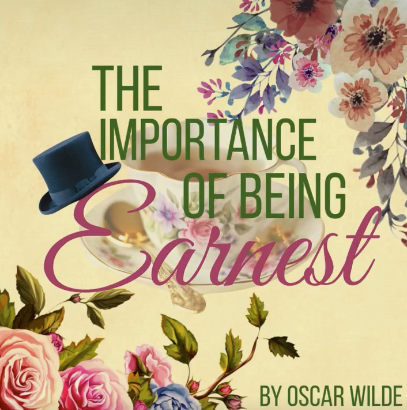Review: The Importance of Being Earnest by Austin Playhouse
by Michael Meigs
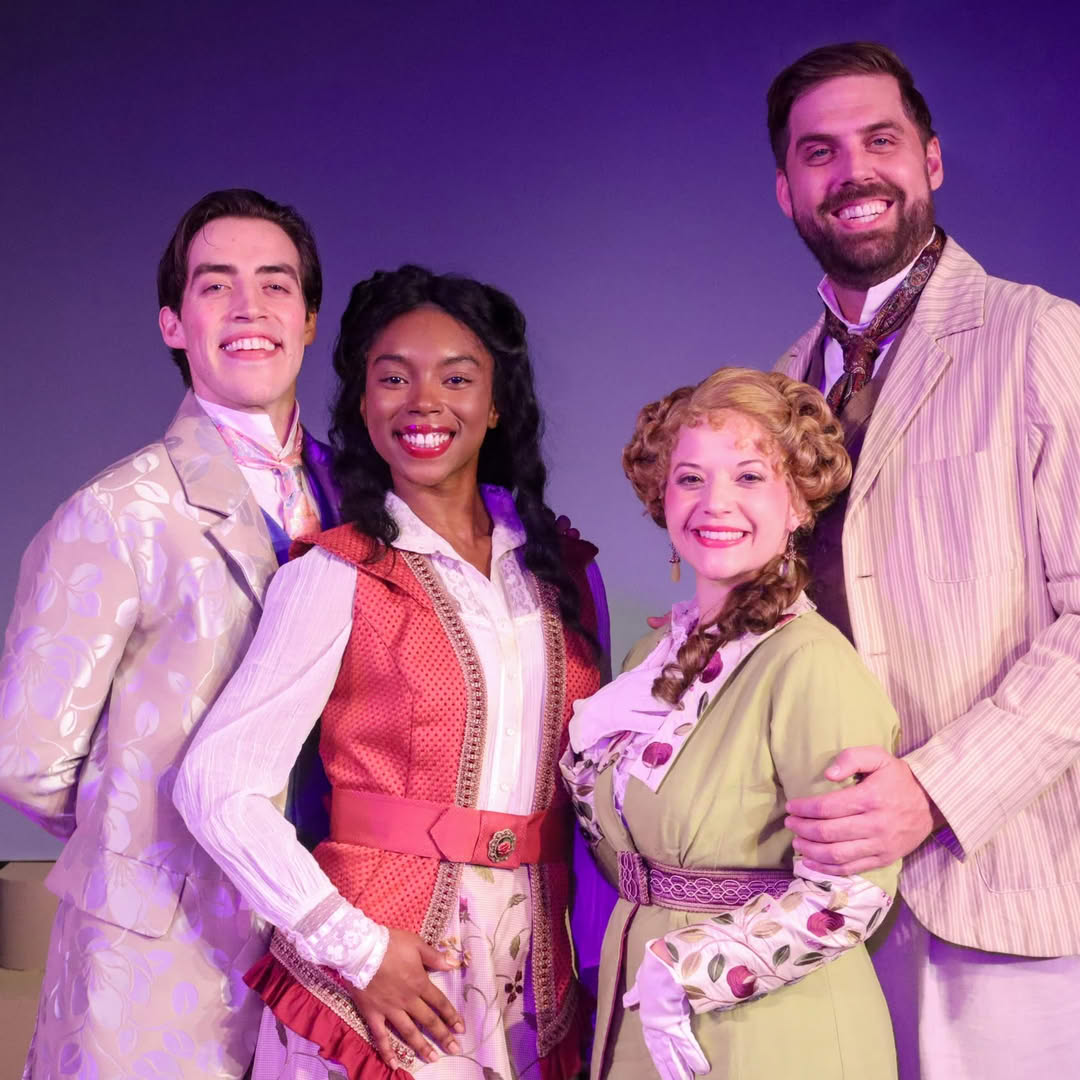 What's a classic? Put quite simply and unanalytically, it's something old that simply never grows old. Fortunately, it doesn't have to be heavy and serious (viz., The Iliad, The Odyssey, Paradise Lost). Wit, fun, and froth usually disappear, but not always. Oscar Wilde's "trivial comedy for serious people" provides gentle satire, plot surprises, and a treasure chest of epigrams, observations, contradictions, and quiddities.
What's a classic? Put quite simply and unanalytically, it's something old that simply never grows old. Fortunately, it doesn't have to be heavy and serious (viz., The Iliad, The Odyssey, Paradise Lost). Wit, fun, and froth usually disappear, but not always. Oscar Wilde's "trivial comedy for serious people" provides gentle satire, plot surprises, and a treasure chest of epigrams, observations, contradictions, and quiddities.
This is the fourth time I've gotten to review the play, so I know whereof I speak when I say that it never gets old. The first Earnest I wrote up was Austin Playhouse's 2011 staging in that awkward space at Penn Field; the most recent previous one was by City Theatre Company ten years ago. In between was the 2013 production at St. Ed's Mary Moody Northen Theatre. The lede of that 2013 review contains my thesis:
Oscar Wilde's The Importance of Being Earnest is so exquisitely written that it will probably never fall out of fashion. Wilde mocks fashion and the fashionable; he presents us with chaps who are guileful but goodhearted deceivers and young ladies dizzy with self importance and good manners. And of course there's Aunt Augusta, the ultimate dragon lady, arbiter of all that's good taste and acceptable in polite society.
The script is balanced, well plotted, vivid and full of clever quips. That's a fearsome task for a director and a company, and probably another reason it will stay in the repertory.
Immodest as it may be for a reviewer to quote himself as an authority (but pardie, who else would?), those comments hold.
Austin Playhouse's lively production of The Importance of Being Earnest populates the cast with vivid talent and makes the most of Oscar Wilde's elegantly clever snark. A story lurks behind the merriment; Wilde's flamboyant personality was so striking and popular that comic opera geniuses W.S. Gilbert and Arthur Sullivan parodied him and the aesthetic movement in their 1881 Patience (to be staged next summer by G&S Austin). That was a full fourteen years before the staging of Earnest, which was a great success. Just two years later Wilde was tried and imprisoned for homosexuality. When released, two years after that, he left to live in Paris and died three years later.
Uncomfortable lessons lie behind all that brilliant wit, so flagrantly wasted, largely because of the very social conventions he skewered.
Bailey Ellis as foppish Algernon, ever munching and always offering bon mots, is probably an avatar for Wilde himself; Devin Finn as Jack aka Ernest when in London, might well be seen as conventional morality, often quite incensed by Algy's epicurian, even hedonistic approach to life. The two are good friends, not in the least sensual, which means they're constantly bouncing off one another. DIsguises and dissembling are central. Algy has invented a fictitious friend named Bunbury, who serves as an excuse for him to disappear intermittently from tedious social duties; Jack tells his ward Cecily that he must often absent himself from the countryside to go up to London to get his fictitious but quite dissolute brother Ernest out of scrapes.
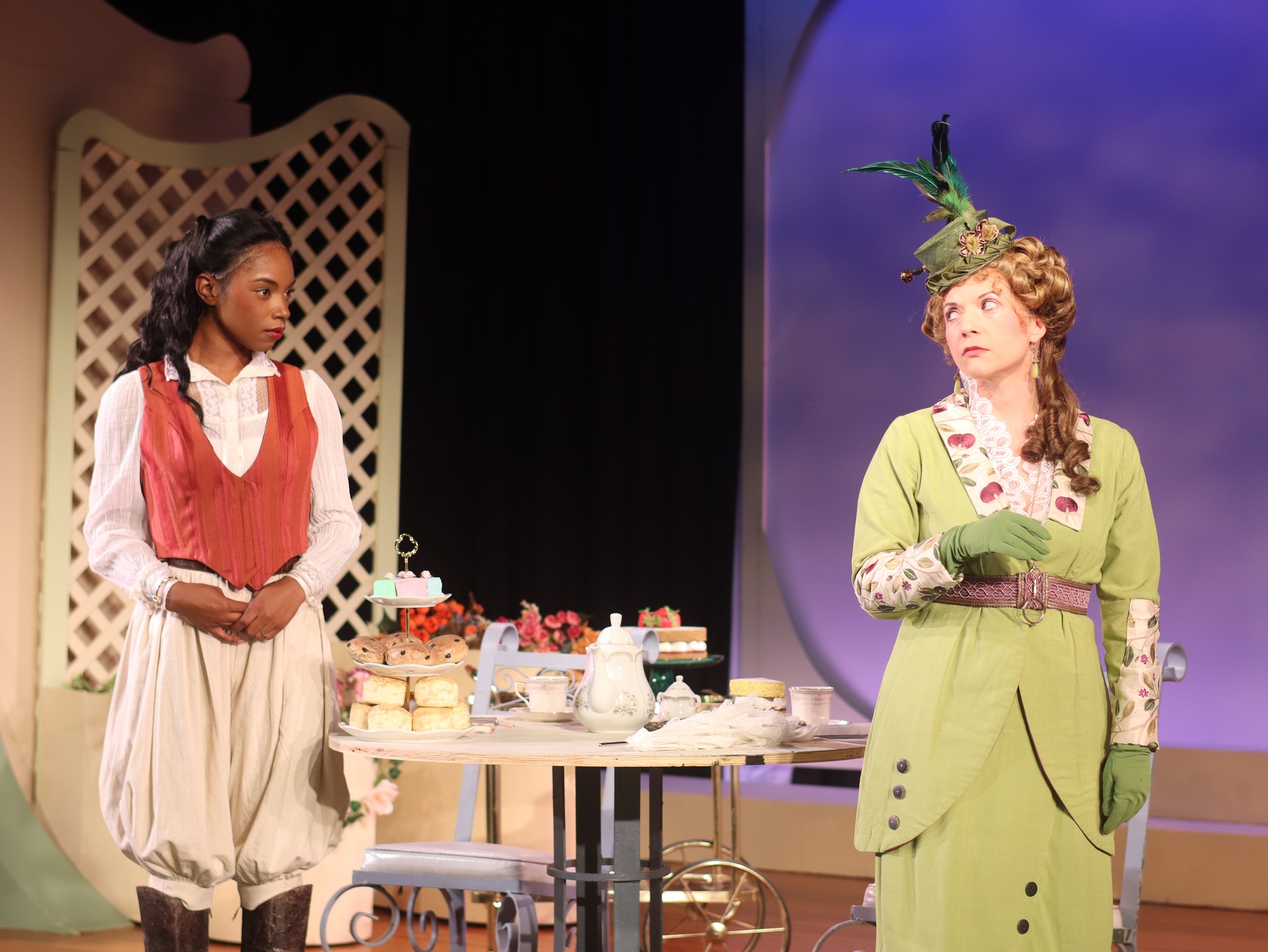
Add to that their love interests: Sarah Zeringue as Gwendolyn, the pert socialite eligible for marriage, whom Jack adores; and Jack's ward Cecily (Vivian Noble, strikingly clever and personable), target of Algy's "Bunburying" expedition. Complicate things further with Aunt Augusta (aptly named), Lady Bracknell, the decisive social arbiter who's quite dismissive of sentiment and keenly attuned to the niceties of London society.
Oh, and don't forget the handbag. Turns out that Jack (known in the country by his own name) aka Ernest (when up in London) was quite literally a foundling, discovered in a handbag at Victoria Station, a fact that provides Babs George as Aunt Augusta the opportunity for a long, delicious silent sequence of reactions as she assimilates this most unfortunate news.
None of this is too complicated to follow as the plot develops, seasoned with Wilde's piquant wit, and all will turn out well in the end.
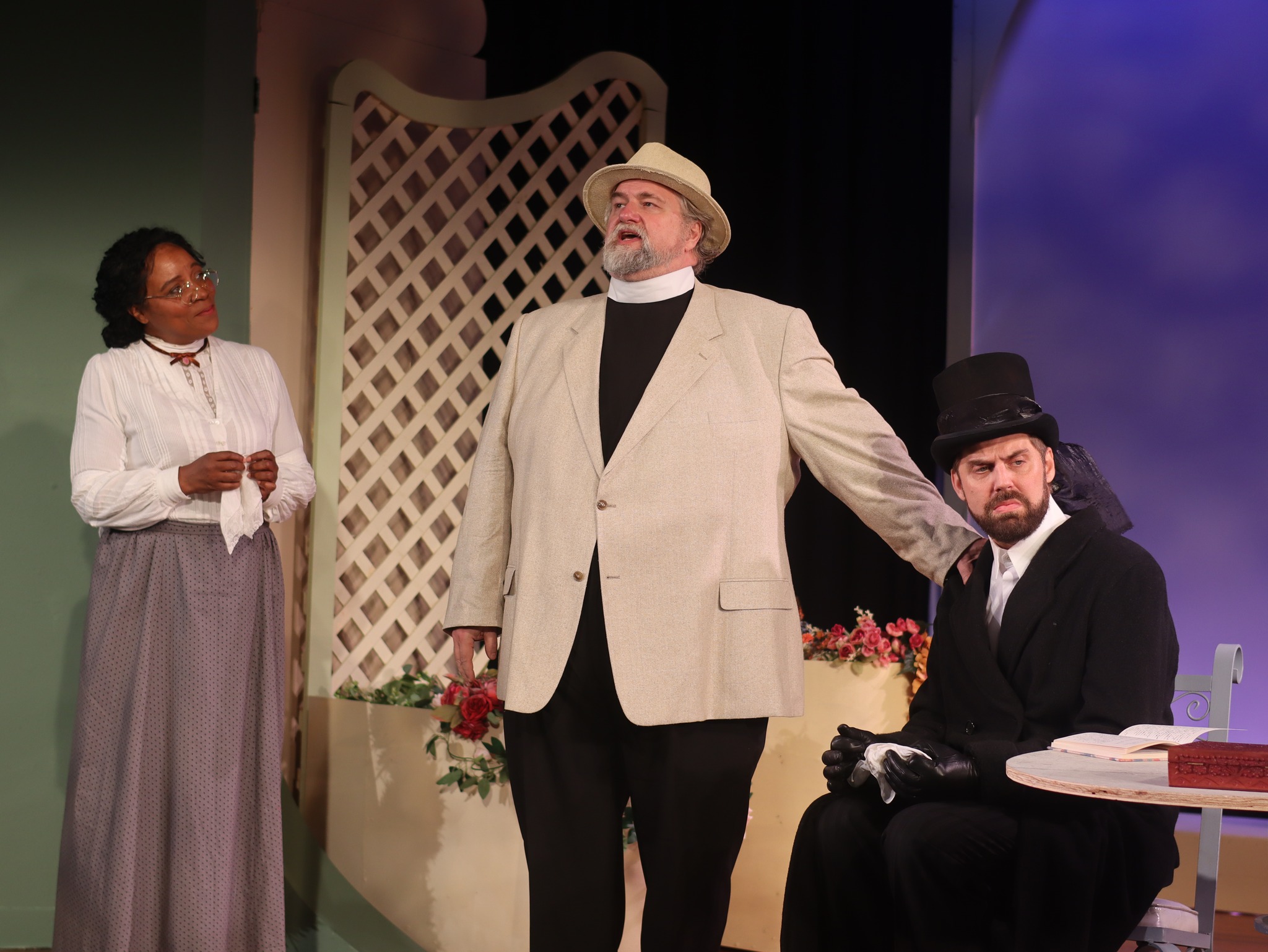 Austin Playhouse isn't quite a repertory theatre inevitably offering the same faces, but to those who follow AP, there's great satisfaction in rediscovering actors. Bailey and Sarah were the multi-character clowns in Ken Ludwig's Baskerville; both Vivian Noble and Gina Houston appeared in completely different roles in the rollicking Fat Ham last June. Modest Hans Venable as two quite distinct butlers has probably been a member of the company forever; and it's a pleasure to see Lowell Bartholomee in the capacious flesh as the (equally) earnest and somewhat dim rector Rev. Chasuble. Bartholomee is more often the ghost in the machine for audiovisuals supplementing Austin theatre pieces.
Austin Playhouse isn't quite a repertory theatre inevitably offering the same faces, but to those who follow AP, there's great satisfaction in rediscovering actors. Bailey and Sarah were the multi-character clowns in Ken Ludwig's Baskerville; both Vivian Noble and Gina Houston appeared in completely different roles in the rollicking Fat Ham last June. Modest Hans Venable as two quite distinct butlers has probably been a member of the company forever; and it's a pleasure to see Lowell Bartholomee in the capacious flesh as the (equally) earnest and somewhat dim rector Rev. Chasuble. Bartholomee is more often the ghost in the machine for audiovisuals supplementing Austin theatre pieces.
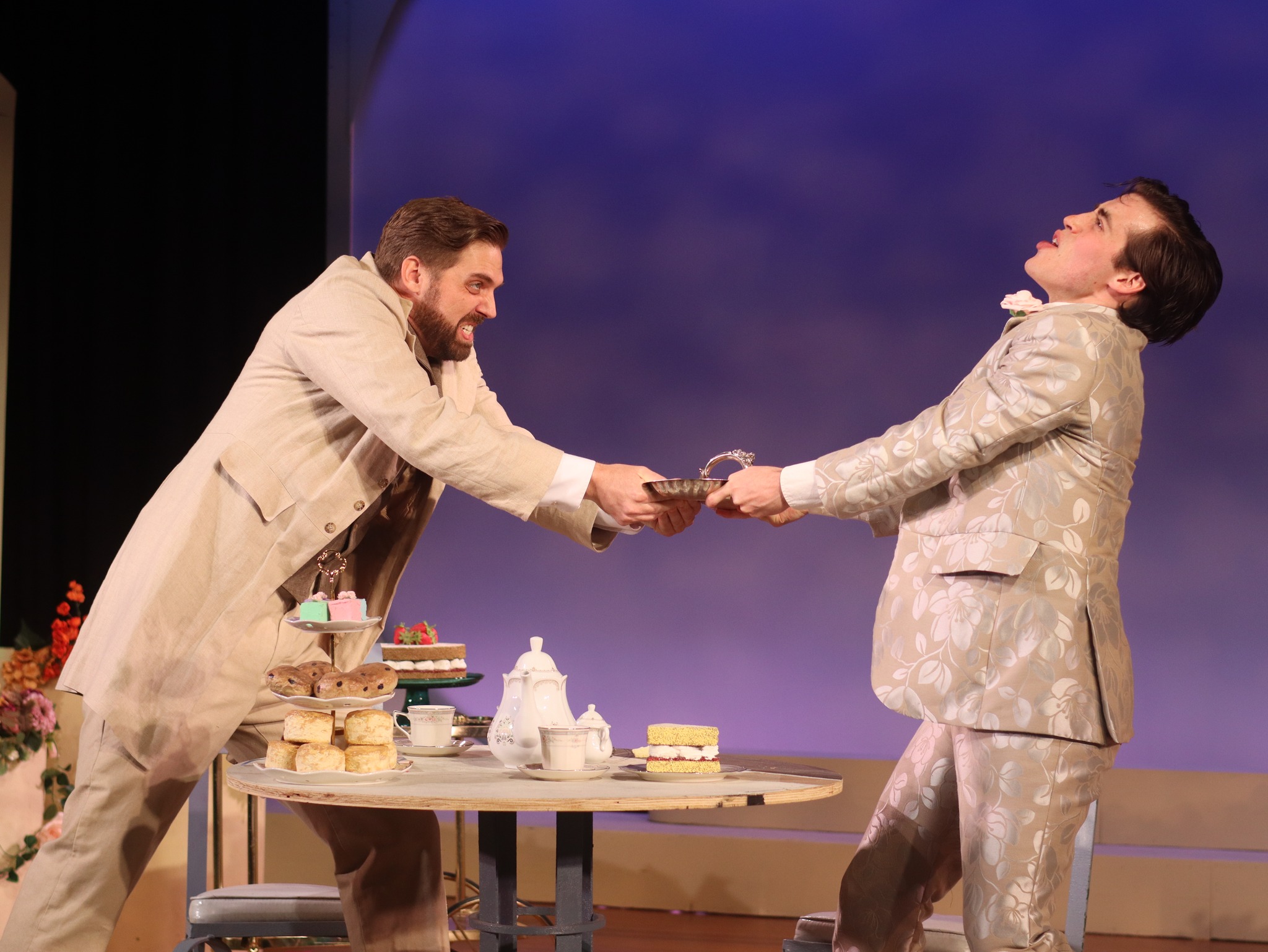
The action is set in July, 1899, according to the program, but there's a dream-like nowhereland flavor to the set and the setting. Director Lara Toner Haddock can't resist some Feydeau poses (a struggle for muffins, the young ladies' simultaneous miffs) that push the script at times clearly toward farce, but movement is generally vigorous and apt. Robert Fisher's sound design draws heavily on early twentieth-century jazz recordings (after the curtain call, we get some Scott Joplin—chronologically accurate but not particularly appropriate for London). Perhaps Aunt Augusta's praise for German music rather than the dubious morality of the French could have led in a different direction. And Art Deco, evoked in Act I set design, was a movement of the 1920's and 1930's.
Costumes by Buffy Manners and Diana Huckaby are extravagant. Both Jack's maroon striped suit in Act I and Algernon's Act II shiny suit of white brocade fabric were over the top and beyond the pale. But the women's costumes (and especilly Aunt Augusta's hats) were lavishly sublime.
The full crowd at opening night enjoyed it immensely, as did I. Such nonsense! Such wit!
Oscar is long gone, but his confident, urbane mockery is likely to keep reminding us how foolish most social convention really is. Austin Playhouse serves up an entertainment light as air, delicious as those muffins disputed by Algy and Jack, and as saucy as Cecily and Gwendolyn.
The Importance of Being Earnest
by Oscar Wilde
Austin Playhouse
September 19 - October 19, 2025
September 19–October 19, 2025
Thurs – Sat at 7:30 p.m. | Sun at 2:00 p.m.
Austin Playhouse (West Campus location) | 405 West 22nd St. | Austin TX 78705
Ticketing Information: Tickets for the 2025-2026 Season range from $24-52 with Pick-Your-Price Thursdays and Half-Price Student Tickets. Group discounts are available for parties of 10+. Group inquiries can be made at boxoffice@playhouse.com. Single tickets on sale now at austinplayhouse.com.
